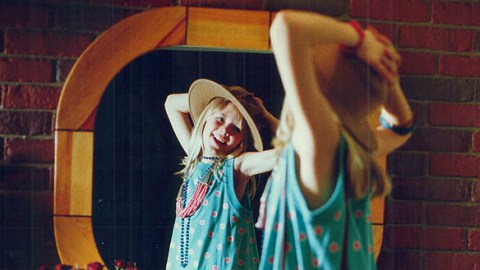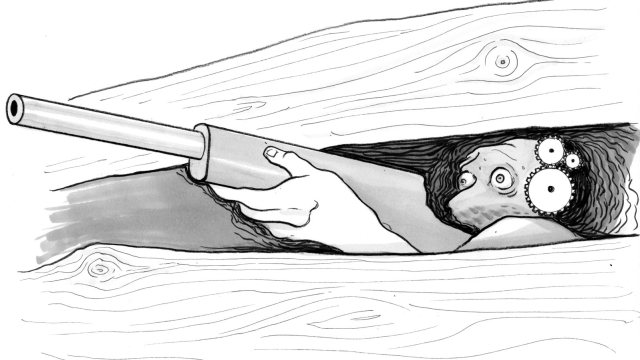Is Praising Our Children Creating More Anxiety?

While walking through the Union Square farmer’s market five years ago, I stopped at a vendor to pick up vegetables. A woman next to me was purchasing a few bags of something, while her child, probably about two years old, reached into the broccoli and pulled out a stem. He proceeded to shove it into his mouth. A moment later, his mother looks down, grabs it from him, and tosses it back into the pile, spit and all.
I mention this. She turns, quickly, rabidly: “Well I guess you don’t have children!” and storms off. I look at the vendor with a gaze of, You’re going to leave that there?, spit still dripping from its side. He reluctantly pulled it from the pile. The lesson, one that I’ve heard over and again: Never tell a parent how to parent.
In fact, there are three untouchables in America: parenting, food, and religion. Criticism in any of these realms is off limits. The first two are often entwined, which has resulted in a stunning increase in childhood obesity and diabetes. As social creatures, our bullheaded turn toward individualism has brought with it unforeseen neuroses and diseases.
But if we don’t question what’s “sacred,” we’ll never really know what value it holds. In August, NFL linebacker James Harrison made headlines when denouncing the notion that “everyone gets a trophy.” When his sons received trophies for participating in athletics, though not winning anything, Harrison returned them. He went on,
Sometimes your best is not enough, and that should drive you to want to do better.
Sagely advice from a man who has risen to the top of his game. Back here in the world of mortals, psychoanalyst Stephen Grosz came to a similar conclusion in his beautiful book, The Examined Life: How We Lose Ourselves And Find Ourselves. A collection of stories from his quarter-century listening to the stories of his patients, he discusses how too much praise can result in a loss of confidence as one matures.
Grosz was made uncomfortable by a nursery assistant constantly heaping praise on his daughter. Too much praise, he knew from a decade of studies, can paralyze a child. He cites a 1998 study of 10- and 11-year-olds. After completing a set of simple mathematical exercises, researchers divided the 128 students into two groups. One set was told they performed excellently due to their cleverness; the other, that they did well because they tried hard.
Faced with more challenging problems, the students who were told they tried hard did exactly that: They were resilient and, when failing, attributed it to insufficient effort, not an internal crisis. The “clever” students, however, responded differently: They became over-concerned with failing, showing less tenacity as the questions grew tougher. Their anxiety levels grew and self-esteem dropped. And those children lied when asked how well they performed later on.
Grosz continues:
In trying so hard to be different from our parents, we’re actually doing much the same thing — doling out empty praise the way an earlier generation doled out thoughtless criticism. If we do it to avoid thinking about our child and her world, and about what our child feels, then praise, just like criticism, is ultimately expressing our indifference.
Excessive praise — or, as some critics argue, any praise — might be a form of control. Heaping good words upon children because we want them to do well is manipulative as it causes them to seek comfort in praise instead of for the satisfaction that the work itself provides. While the research behind this is focused on youngsters, it is easy to see how emotionally stunted adults play out these childish fantasies on social media platforms, constantly seeking approval through likes and followers.
An aversion to criticism is unhealthy, however, as long as it attempts to build up, not knock down. Harrison didn’t want his sons growing up learning that just showing up is enough if you want to excel in life. The potential for lethargy is great; the anxiety that follows is tragic.
We witness this in American society daily. In his book My Age of Anxiety, Scott Stossel writes that while the number of prescriptions of anti-anxiety medication is continually rising, the number of people reporting anxiety is not shrinking. Collectively, American workers miss 321 million days per year, to the tune of $50 billion — again, a number on the ascent.
Can we blame all of this on too much childhood praise? Of course not. Nothing is so simple. Yet to wrap our heads around what we’ve become, we have to investigate how we’ve gotten where we are. Those three untouchables — how we raise our children, what we put into our bodies, and what we put into our heads — need to be touched, contemplated, grappled with, and, if need be, ripped apart and begun again. Turning a blind eye to our dark spots will never bring light to how we move forward. Instead of yelling at the guy pointing out the spittle on the broccoli, perhaps it might be all right to start teaching your child what goes into (and comes out of) your mouth matters.
Image: Christian Science Monitor / Getty Images





